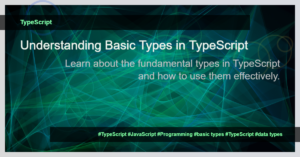10 TypeScript Interview Questions and Answers
Are you preparing for a TypeScript interview? Whether you’re a beginner or an experienced developer, it’s essential to have a strong understanding of TypeScript concepts and be prepared to tackle specific interview questions. In this article, we’ve compiled a list of the top 10 TypeScript interview questions to help you prepare and succeed in your upcoming interviews. Let’s dive in!
- What is TypeScript?
TypeScript is a superset of JavaScript that adds static typing to the language. It provides optional static typing, classes, interfaces, and other advanced features that help developers write more robust and maintainable code.
// Example
function sayHello(name: string) {
console.log(`Hello, ${name}!`);
}
sayHello('John');
- What are the advantages of using TypeScript?
- TypeScript catches potential errors during development, reducing bugs in production.
- It provides better code readability and maintainability with static typing.
- TypeScript supports modern JavaScript features and compiles down to browser-compatible JavaScript.
- What is the difference between TypeScript and JavaScript?
- TypeScript is a superset of JavaScript, meaning all JavaScript code is valid TypeScript code.
- TypeScript adds static typing, which helps catch errors at compile time.
- TypeScript supports modern JavaScript features like classes, modules, and interfaces.
- Explain the concept of static typing in TypeScript.
Static typing in TypeScript enables developers to specify the type of variables, function parameters, and return types. This helps catch type-related errors during development and improves the overall code quality.
// Example
let count: number = 5;
function add(a: number, b: number): number {
return a + b;
}
let result: number = add(3, 7);
- What is the use of interfaces in TypeScript?
Interfaces in TypeScript define contracts for objects, specifying the required properties and their types. They provide a way to ensure that objects adhere to a specific structure and can be used for type checking and code documentation.
// Example
interface Person {
name: string;
age: number;
}
function greet(person: Person) {
console.log(`Hello, ${person.name}! You are ${person.age} years old.`);
}
let john: Person = {
name: 'John',
age: 25,
};
greet(john);
- What is the difference between
nullandundefinedin TypeScript?
nullrepresents the intentional absence of an object value.undefinedrepresents the absence of any value or uninitialized variables.
- What are generics in TypeScript?
Generics in TypeScript allow developers to create reusable components that can work with multiple types. They enable type-safe coding and provide flexibility to functions, classes, and interfaces by allowing them to work with any data type.
// Example
function identity<T>(arg: T): T {
return arg;
}
let value: number = identity(5);
let name: string = identity('John');
- What is the
readonlymodifier in TypeScript?
The readonly modifier in TypeScript allows developers to mark properties of an object as read-only. Once assigned a value, a readonly property cannot be changed. This ensures the immutability of certain properties and prevents accidental modifications.
// Example
class Circle {
readonly radius: number;
constructor(radius: number) {
this.radius = radius;
}
}
let circle = new Circle(5);
console.log(circle.radius);
- How can you ensure type safety in TypeScript?
TypeScript provides features like static typing, interfaces, and generics to ensure type safety. By explicitly specifying types and implementing proper type checks, developers can catch potential errors early and write more reliable and robust code.
- What is module resolution in TypeScript?
Module resolution in TypeScript refers to how the compiler resolves and loads external modules. It can be configured to use different strategies such as classic, node, or webpack. The module resolution process ensures that the dependencies are correctly resolved at compile-time.
These are just a few of the many TypeScript interview questions you may encounter. It’s essential to not only know the answers but also understand the underlying concepts. Practice these questions, and dive deeper into TypeScript to boost your confidence and excel in your next interview.
Remember, interviews are not just about getting the right answer but also demonstrating your problem-solving skills and communication abilities. Good luck with your TypeScript interviews!










